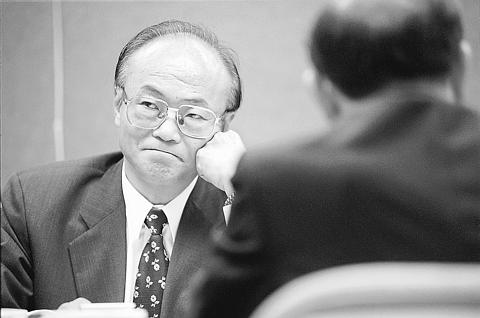Three Cabinet officials who come from academic circles were accused by legislators of allegedly plagiarizing their students' theses, local media reported yesterday.
A lawmaker who requested not to be named, over the weekend accused the National Science Council Chairman Weng Cheng-i (翁政義) of plagiarism. The lawmaker said that a research paper written by the official in 1994 resembled a thesis by Sun Yen-shuo (孫彥碩), a student of Weng's.
"If investigations proves [the alleged plagiarism] is true, I will step down," the NSC chairman said during a meeting with lawmakers from the Technology and Information Committee at the Legislative Yuan.

PHOTO: CHEN CHENG-CHANG, TAIPEI TIMESN
Two more officials, Minister of Education Ovid Tseng (
The PFP lawmakers said Tseng received NT$667,300 of funding from the NSC in 1996 for research on the Chinese language.
The lawmakers claimed that an excerpt from the piece of research, which was completed in July 1997, is almost exactly the same as a thesis written by Ho Chia-yun (何佳芸) in July 1996, with only six words being different.
"How could it be possible? I am very self-disciplined when it comes to academic research. It's a very serious accusation," said the education minister after hearing that he was accused of academic plagiarism.
However, the acting Director of the Higher Education Department Chen Te-hua (
The opposition lawmakers also accused the public construction commission chairman, saying that a management research paper conducted by the official and funded by the NSC in 1993 closely resembled a thesis written by Tseng Teh-ming (曾德銘), a graduate student from the National Taiwan University, in July 1994.
The official denied the lawmakers' accusation by saying that he proposed the research first and it was not possible for the two papers to be completely the same.

AGING: As of last month, people aged 65 or older accounted for 20.06 percent of the total population and the number of couples who got married fell by 18,685 from 2024 Taiwan has surpassed South Korea as the country least willing to have children, with an annual crude birthrate of 4.62 per 1,000 people, Ministry of the Interior data showed yesterday. The nation was previously ranked the second-lowest country in terms of total fertility rate, or the average number of children a woman has in her lifetime. However, South Korea’s fertility rate began to recover from 2023, with total fertility rate rising from 0.72 and estimated to reach 0.82 to 0.85 by last year, and the crude birthrate projected at 6.7 per 1,000 people. Japan’s crude birthrate was projected to fall below six,

Conflict with Taiwan could leave China with “massive economic disruption, catastrophic military losses, significant social unrest, and devastating sanctions,” a US think tank said in a report released on Monday. The German Marshall Fund released a report titled If China Attacks Taiwan: The Consequences for China of “Minor Conflict” and “Major War” Scenarios. The report details the “massive” economic, military, social and international costs to China in the event of a minor conflict or major war with Taiwan, estimating that the Chinese People’s Liberation Army (PLA) could sustain losses of more than half of its active-duty ground forces, including 100,000 troops. Understanding Chinese

US President Donald Trump in an interview with the New York Times published on Thursday said that “it’s up to” Chinese President Xi Jinping (習近平) what China does on Taiwan, but that he would be “very unhappy” with a change in the “status quo.” “He [Xi] considers it to be a part of China, and that’s up to him what he’s going to be doing, but I’ve expressed to him that I would be very unhappy if he did that, and I don’t think he’ll do that. I hope he doesn’t do that,” Trump said. Trump made the comments in the context

SELF-DEFENSE: Tokyo has accelerated its spending goal and its defense minister said the nation needs to discuss whether it should develop nuclear-powered submarines China is ramping up objections to what it sees as Japan’s desire to acquire nuclear weapons, despite Tokyo’s longstanding renunciation of such arms, deepening another fissure in the two neighbors’ increasingly tense ties. In what appears to be a concerted effort, China’s foreign and defense ministries issued statements on Thursday condemning alleged remilitarism efforts by Tokyo. The remarks came as two of the country’s top think tanks jointly issued a 29-page report framing actions by “right-wing forces” in Japan as posing a “serious threat” to world peace. While that report did not define “right-wing forces,” the Chinese Ministry of Foreign Affairs was